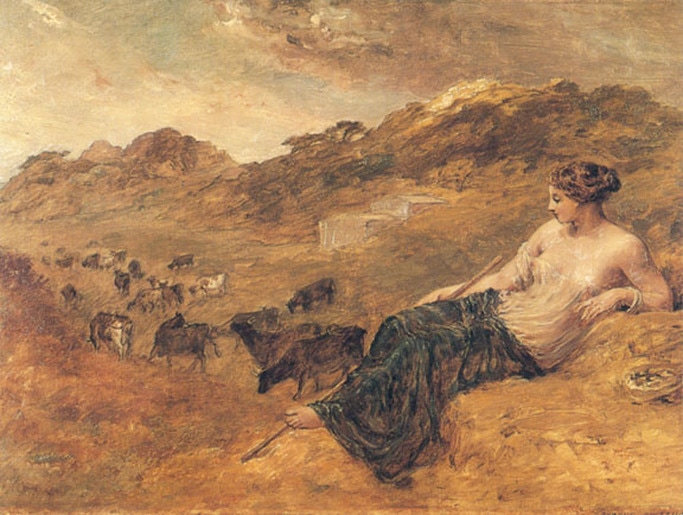CYRENE IN GREEK MYTHOLOGY
Cyrene was one of the most beautiful figures in Greek mythology, so beautiful indeed that Apollo would take Cyrene as his lover.
The Beautiful Cyrene
Cyrene is normally said to have been a mortal princess, daughter of King Hypseus, king of the Lapiths, and an unnamed nymph. Cyrene had two named sisters, Themisto and Astyaguia.
Hypseus was a son of the Potamoi Peneus and Creusa, but some would say that Cyrene was not a daughter of Hypseus but was his sister, having been born to Peneus. This would make Cyrene not a mortal princess, but a Naiad nymph.
Hypseus was a son of the Potamoi Peneus and Creusa, but some would say that Cyrene was not a daughter of Hypseus but was his sister, having been born to Peneus. This would make Cyrene not a mortal princess, but a Naiad nymph.
The Huntress Cyrene
Certainly Cyrene had the beauty of the nymphs, with some saying Cyrene was a rival for the Charites in looks. In many ways though, Cyrene was more like Artemis, for Cyrene became a huntress of some note, and one, who like the goddess, was protective of her virtue.
Cyrene’s skill as a huntress ensured that she became the chief protector of her father’s cattle and sheep, and it was in this role that she was chanced upon by the Greek god Apollo.
As a lion attacked the cattle of Hypseus, Cyrene did not kill it with a javelin or arrow, but instead wrestled with it, until it succumbed. Apollo was greatly taken by the strength and daring of Cyrene, and it was said by some that Apollo even deigned to ask the centaur Chiron about the woman he had observed.
Cyrene’s skill as a huntress ensured that she became the chief protector of her father’s cattle and sheep, and it was in this role that she was chanced upon by the Greek god Apollo.
As a lion attacked the cattle of Hypseus, Cyrene did not kill it with a javelin or arrow, but instead wrestled with it, until it succumbed. Apollo was greatly taken by the strength and daring of Cyrene, and it was said by some that Apollo even deigned to ask the centaur Chiron about the woman he had observed.
The Abduction of Cyrene
|
Overcome with love, or lust, Apollo decided to abduct Cyrene, and so the daughter of Hypseus was whisked up in Apollo’s golden chariot and she quickly found herself in another continent, for Apollo had taken Cyrene to Libya.
Apollo would lie with Cyrene at a place once named the Myrtle Hill, and as a result, Cyrene would give birth to a son, who would be named Aristaeus. Apollo would give Aristaeus ambrosia and nectar, making him one of the immortals. |
|
Aristaeus Son of Cyrene
|
Aristaeus would be taken from Cyrene as a new born and given in to the care of the Horai (Seasons) and Gaia, before he was then taken to Chiron for tutoring.
Aristaeus would excel keeping bees and making honey, as well as the tending of olive trees, and the curdling of milk; although it was for the provision of honey which would see Aristaeus worshipped as a god. Despite being separated from her son at a young age, Cyrene would be a reoccurring figure in the stories of the adult Aristaeus, aiding him as required. Other Children of CyreneSome also name the seer Idmon as a son of Apollo and Cyrene, although the Argonaut Idmon, is also called the son of Apollo by Asteria. Additionally, other children of Apollo and Cyrene are also named, with a son, Coeranus, and daughter, Lyscimache, talked of.
But some also say that Idmon, Coeranus and Lyscimache were not the sons of Apollo but were born to Cyrene by Abas, an Argive seer. Occasionally, Cyrene is also called mother of King Diomedes of Thrace, by the god Ares, although there is a strong possibility that this was a different Cyrene. Diomedes would of course be the owner of the famous horses taken by Heracles. |
|
Cyrene Transformed
At the spot where Cyrene was deposited a new city would grow, a city called Cyrene after Apollo’s lover, and some tell that it was actually Apollo who established the city. The area around the city would also be known as Cyrenaica.
Whilst Cyrene would be left behind in Libya, Apollo honoured her by turning her into a nymph, guaranteeing Cyrene long life, or possibly immortality.
Whilst Cyrene would be left behind in Libya, Apollo honoured her by turning her into a nymph, guaranteeing Cyrene long life, or possibly immortality.
|
|

